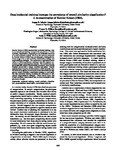Does incidental training increase the prevalence of overall similarity classification? A re-examination of Kemler Nelson (1984)
| dc.contributor.author | Inkster, AB | |
| dc.contributor.author | Milton, FN | |
| dc.contributor.author | Wills, Andy | |
| dc.date.accessioned | 2014-08-12T08:30:26Z | |
| dc.date.accessioned | 2014-08-12T08:30:41Z | |
| dc.date.available | 2014-08-12T08:30:26Z | |
| dc.date.available | 2014-08-12T08:30:41Z | |
| dc.date.issued | 2014-08-12 | |
| dc.identifier.isbn | 9780991196708 | |
| dc.identifier.uri | http://hdl.handle.net/10026.1/3068 | |
| dc.description.abstract |
Kemler Nelson (1984) reported that incidental training, relative to intentional training, increased the prevalence of overall similarity classification, supporting a non-deliberative account of overall similarity sorting. However, the analysis conducted by Kemler Nelson (1984) does not adequately distinguish between usage of an overall similarity classification strategy and single-attribute strategies. The current study replicates Kemler Nelson’s (1984) experiment, seeking to test the original conclusions using a more rigorous analysis. The current study approximates the original experimental procedure, using almost identical stimuli and a longer, modified test phase. Results replicate those found by Kemler Nelson (1984) when the original analysis is applied; however the model-based analysis suggest an overall similarity classification strategy is used rarely and that incidental training increases the prevalence of suboptimal single-attribute strategies. These results imply that overall similarity classification may be more deliberative than previously thought. | |
| dc.format.extent | 649-653 | |
| dc.language.iso | en | |
| dc.publisher | Cognitive Science Society | |
| dc.relation.replaces | http://hdl.handle.net/10026.1/3067 | |
| dc.relation.replaces | 10026.1/3067 | |
| dc.title | Does incidental training increase the prevalence of overall similarity classification? A re-examination of Kemler Nelson (1984) | |
| dc.type | conference | |
| dc.type | Conference Proceeding | |
| plymouth.publication-status | Published | |
| plymouth.journal | Proceedings of the 36th Annual Conference of the Cognitive Science Society | |
| plymouth.organisational-group | /Plymouth | |
| plymouth.organisational-group | /Plymouth/Admin Group - REF | |
| plymouth.organisational-group | /Plymouth/Admin Group - REF/REF Admin Group - FoH | |
| plymouth.organisational-group | /Plymouth/Faculty of Health | |
| plymouth.organisational-group | /Plymouth/REF 2021 Researchers by UoA | |
| plymouth.organisational-group | /Plymouth/REF 2021 Researchers by UoA/UoA04 Psychology, Psychiatry and Neuroscience | |
| plymouth.organisational-group | /Plymouth/Research Groups | |
| plymouth.organisational-group | /Plymouth/Research Groups/Institute of Health and Community | |
| plymouth.organisational-group | /Plymouth/Users by role | |
| plymouth.organisational-group | /Plymouth/Users by role/Academics | |
| dc.publisher.place | Austin, TX | |
| dc.rights.embargoperiod | Not known | |
| rioxxterms.licenseref.uri | http://www.rioxx.net/licenses/all-rights-reserved | |
| rioxxterms.type | Conference Paper/Proceeding/Abstract |


